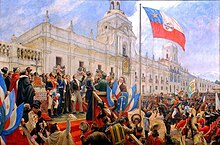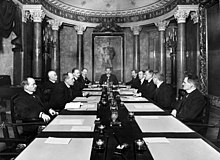Independence




Independence is a condition of a person, nation, country, or state in which residents and population, or some portion thereof, exercise self-government, and usually sovereignty, over its territory. The opposite of independence is the status of a dependent territory.
Definition of independence[]
Whether the attainment of independence is different from revolution has long been contested, and has often been debated over the question of violence as legitimate means to achieving sovereignty.[2] In general, revolutions aim only to redistribute power with or without an element of emancipation, such as in democratization within a state, which as such may remain unaltered. For example, the Mexican Revolution (1917) chiefly refers to a multi-factional conflict that eventually led to a new constitution; it has rarely been used to refer to the armed struggle (1821) against Spain. However, some wars of independence have been described as revolutions, such as the ones in the United States (1783) and Indonesia (1949), while some revolutions that were specifically about a change in the political structure have resulted in breakaway states. Mongolia and Finland, for example, gained their independence during the revolutions occurring in China (1911) and Russia (1917) respectively. Causes for a country or province wishing to seek independence are many, but most can be summed up as a feeling of inequality compared to the dominant power. The means can extend from intended peaceful demonstrations as in the case of India (1947), to a violent war as in the case of Algeria (1962).
Distinction between independence and autonomy[]
Autonomy refers to a kind of independence which has been granted by an overseeing authority that itself still retains ultimate authority over that territory (see Devolution). A protectorate refers to an autonomous region that depends upon a larger government for its protection as an autonomous region.
Declarations of independence[]


Sometimes, a state wishing to achieve independence from a dominating power will issue a declaration of independence; the earliest surviving example is Scotland's Declaration of Arbroath in 1320, with the most recent example being Azawad's declaration of independence in 2012. Declaring independence and attaining it, however, are quite different. A well-known successful example is the U.S. Declaration of Independence issued in 1776. The dates of established independence (or, less commonly, the commencement of revolution), are typically celebrated as a national holiday known as an independence Day.
Historical overview[]
Historically, there have been four major periods of declaring independence:
- from the 1770s, beginning with the American Revolutionary War through the 1830s, when the last royalist bastions fell at the close of the Spanish American wars of independence;
- the immediate aftermath of the First World War following the breakup of the Ottoman, Austro-Hungarian, Russian, German empires;
- 1945 to circa 1979, when seventy newly independent states emerged from the European colonial empires and the collapse of the Nazi German Reich and the Empire of Japan;[3]
- and the early 1990s, following the breakup of the Soviet Union, Czechoslovakia and Yugoslavia.
Continents[]
| Continent | No. | Last Country to Gain Independence | |
|---|---|---|---|
 |
Africa
|
54 | |
Americas
|
35 | ||
Asia
|
44[b] | ||
Europe
|
50[b] | ||
Oceania
|
14 | ||
| N/A | de facto condominium international | ||
See also[]
- Independence constitution
- Independence referendum
- List of national independence days
- List of sovereign states by date of formation
- Lists of active separatist movements
- Secession
- Special Committee on Decolonization
- War of Independence
- Unilateral declaration of independence
- United Nations list of Non-Self-Governing Territories
Notes[]
- ^ Independence from the United Kingdom.
- ^ Jump up to: a b Part of Transcaucasian Region, at the crossroads of Europe and Asia. Physiographically, Armenia falls entirely in Western Asia, while Georgia and Azerbaijan are mostly in Asia with small portions north of the Caucasus Mountains divide in Europe.
- ^ Partially recognized de facto self-governing entity. It is recognised by 102 UN members the Cook Islands, Niue and Taiwan. Claimed by Serbia as the Autonomous Province of Kosovo and Metohija under UN administration.
- ^ An independent state in free association with the United States.
References[]
| Wikiquote has quotations related to: Independence |
- ^ Osmo Jussila – Seppo Hentilä – Jukka Nevakivi (1999). From Grand Duchy to a Modern State: A Political History of Finland Since 1809. London: C. Hurst & Co. p. 103. ISBN 0-8093-9112-0.
- ^ Benjamin, Walter (1996) [1921]. Walter Benjamin: Selected Writings, Volume 1: 1913–1926. Cambridge: Harvard University Press. 236–252. ISBN 0-674-94585-9.
- ^ David Armitage, The Declaration of Independence in World Context, Organization of American Historians, Magazine of History, Volume 18, Issue 3, Pp. 61–66 (2004)
Further reading[]
- Jeremy Bentham (1830), Emancipate your colonies! (1st ed.), London, Wikidata Q19094713
- Rudyard Kipling (1924), Independence, Garden City: Doubleday, Wikidata Q100272896
- Independence
- Political theories
- Nationalism
- Sovereignty
- Decolonization